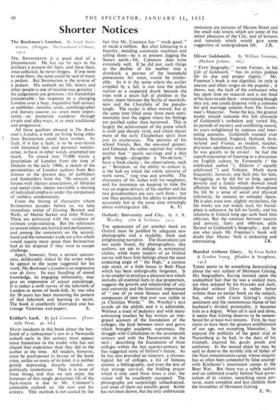Shorter Notices
MR. SWINNERTON is a good deal of a phenomenon. He has (as he says in his preface) a passion for facts, and these facts, once collected, he never forgets. If one were to stop there, the same could be said of many a pedant. But Swinnerton is the reverse of a pedant. His outlook on life, letters and other people is one of mischievous geniality ; his judgements are generous ; his friendships innumerable ; his response to a changing London over a busy, inquisitive half century as publisher, novelist, critic, autobiographer and literary causeur, as—even more impor- tantly—an inveterate wanderer through streets and alley-ways, is at once traditional and progressive.
All these qualities abound in The Book- man's London, a work no living being other than Swinnerton could have written. Its ' fault, if it has a fault, is to be over-lavish with historical fact and personal reminis- cence, to have, in other words, attempted too much. To crowd into 75,000 words a description of London from the time of Dickens to the early 1900s, a sketch of the personalities of London authors from Ben Jonson to the present day, of publishers and booksellers from the '70s onward, of houses with literary associations, of libraries and social clubs, means inevitably a slurring of individual emphasis under the compulsion of ruthless condensation.
From the throng of characters whom Swinnerton parades before us, we take immediate notice of Gissing, Bennett and Wells, of Martin Seeker and John Wilson. These are portrayed with the vividness of intimate understanding. But the references to several others are hurried and perfunctory; and among the comments on the second- hand and the remainder trade are a few which would require more space than Swinnerton had at his disposal if they were to escape challenge.
Apart, however, from a certain uneven- ness, deliberately risked by the writer when he agreed to the scope suggested for his work, The Bookman 's London is an impressive tour de force. Its easy handling of stored knowledge, its engaging informality, may give an impression of casual anecdotage. It is rather a swift survey of the labyrinth of London in terms of book-folk, by one who for 50 years has been mastering the pattern of that labyrinth and learning its secret. The book is excellently illustrated and has vintage Victorian end-papers. S.


































 Previous page
Previous page